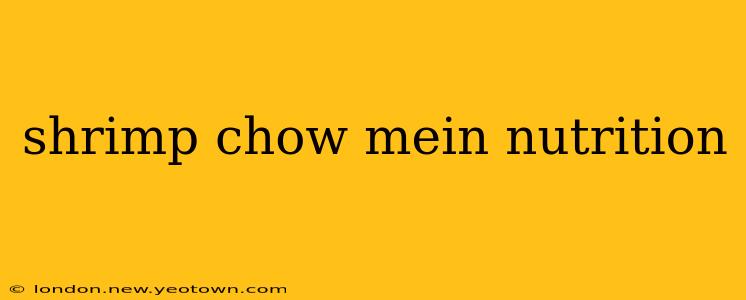Let's be honest, shrimp chow mein is a tempting treat. The savory aroma, the delightful combination of textures—crispy noodles and succulent shrimp—it's a culinary experience that's hard to resist. But beyond the deliciousness, what's the nutritional profile of this popular dish? This isn't just about calories; we'll delve into the vitamins, minerals, and potential health impacts of shrimp chow mein, exploring both its benefits and drawbacks. Our journey will unravel the nutritional secrets hidden within each flavorful bite.
What are the nutritional benefits of shrimp chow mein?
Shrimp chow mein, when prepared thoughtfully, can contribute positively to your diet. Shrimp itself is a powerhouse of protein and essential nutrients. It's low in fat and a fantastic source of selenium, a trace mineral crucial for thyroid function and antioxidant defense. The noodles, while primarily carbohydrates, provide energy. The vegetables often included—think bok choy, carrots, and snap peas—boost the fiber and vitamin content. A well-balanced shrimp chow mein can be a source of vitamins A, C, and K, along with various minerals. The key, however, lies in how it's prepared.
How many calories are in shrimp chow mein?
The calorie count in shrimp chow mein varies drastically depending on the ingredients and portion size. A restaurant serving might easily clock in at 800-1200 calories or more, often due to high levels of oil, sodium, and added sugars. However, a home-cooked version, made with lean protein, plenty of vegetables, and a light hand with the oil and soy sauce, can significantly reduce the calorie count, potentially falling within the 400-600 calorie range for a reasonable portion.
Is shrimp chow mein good for weight loss?
This is a complex question. As we've established, the caloric content is highly variable. While shrimp chow mein can be part of a weight-loss diet if prepared carefully, it’s not a guaranteed weight-loss food. The high sodium content in many versions can lead to water retention, and excessive oil and added sugars can quickly derail your weight-loss goals. The best approach is to opt for a homemade version with controlled portion sizes and a focus on healthy ingredients.
What are the potential drawbacks of eating shrimp chow mein?
Despite its potential benefits, shrimp chow mein does come with potential drawbacks. Many restaurant versions are high in sodium, which can contribute to high blood pressure in susceptible individuals. Excessive oil usage increases the fat and calorie content, negatively impacting weight management efforts. Additionally, the use of processed ingredients and added sugars can diminish the nutritional value and add empty calories.
Is shrimp chow mein healthy?
The answer, as with most foods, is: it depends. Shrimp chow mein’s healthfulness hinges on the ingredients and preparation methods. A carefully prepared homemade version, emphasizing lean protein, fresh vegetables, and minimal oil and sodium, can be a nutritious and satisfying meal. Conversely, restaurant versions often laden with oil, sodium, and added sugars can be less healthful.
How can I make healthy shrimp chow mein?
Making healthy shrimp chow mein at home empowers you to control the ingredients and portions. Choose lean protein, load up on colorful vegetables, use a minimal amount of healthy oil (like olive oil or avocado oil), and opt for low-sodium soy sauce or tamari. Consider whole-wheat noodles for added fiber. Remember, mindful portion control is crucial to reaping the benefits of this dish.
By understanding the nutritional nuances of shrimp chow mein and prioritizing homemade, health-conscious preparations, you can enjoy this culinary delight while maximizing its nutritional benefits and minimizing any potential drawbacks. Remember, moderation and informed choices are key to a balanced and healthy diet.

